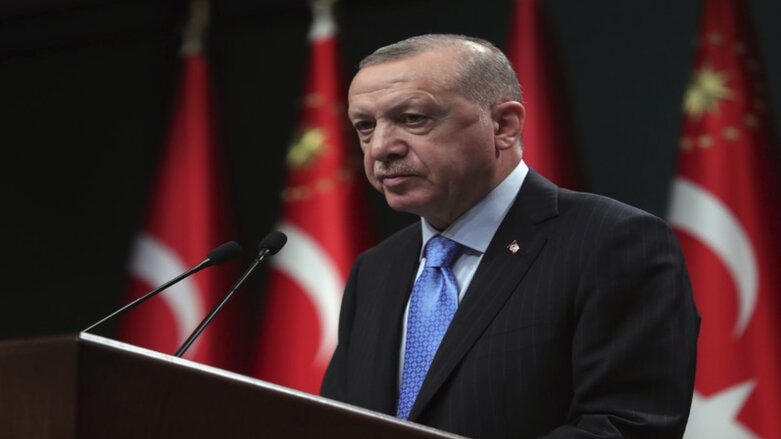As Erdogan opposes Sweden, Finland joining NATO, he denounces US relaxation of sanctions on Rojava
The admission of a new member to NATO can be blocked by any current member, and Erdogan's opposition to Sweden and Finland joining NATO is a matter of widespread concern.

WASHINGTON DC (Kurdistan 24) – Following Friday prayers in Istanbul, Turkish President Recep Tayyip Erdogan spoke to journalists and made two significant statements—which may well be related—in response to their questions.
In one, Erdogan voiced his opposition to Sweden and Finland joining NATO. In the other, he denounced the US decision to relax sanctions in areas of Syria from which ISIS has been expelled but which are not controlled by Damascus.
Most such areas are controlled by the Syrian Democratic Forces (SDF). The Kurdish YPG (People's Protection Units) forms the core and leadership of the SDF, but the US and Turkey disagree sharply over the YPG.
The US has a positive view of the YPG. It is America's main partner in the anti-ISIS war in Syria. However, Turkey considers it a terrorist group.
Thus, Turkey could have been expected to oppose the US relaxation of sanctions in those areas of Syria under SDF control. However, the US measure was sweetened by the fact that sanctions will also be relaxed under areas of Syria controlled by Turkish-backed groups. Nevertheless, that does not appear to have satisfied Erdogan.
Erdogan's Statements—including Continued Military Operations
In his press conference on Friday, Erdogan was asked "about Finland's and Sweden's possible NATO membership," as the website of the Turkish presidency explains.
"We are following the developments about Sweden and Finland. However, we don't have a positive opinion," Erdogan said.
"Scandinavian countries are, unfortunately, like a guesthouse of terrorist organizations," he added. "The PKK [Kurdistan Workers' Party], DHKP-C [Revolutionary People's Liberation Party/Front] nestle in Sweden, the Netherlands."
Since the Netherlands is not a Scandinavian country, it is unclear why Erdogan mentioned it. Yet, as he concluded, "At this point, it is not possible for us to have a positive opinion."
In responding to another question "about the US decision to ease sanctions on Syria," Erdogan stated, according to the presidency's website, "The YPG is a terrorist organization. The PKK and the YPG are the same. Therefore, it is not possible for us to accept this mistake of the US."
"Unfortunately, all the recent administrations in the US have provided every kind of material support to the PKK terrorist organization and the groups in Syria, in the north of Syria," Erdogan continued.
"They have transferred equipment and ammunition to these places by trucks," he added. Turkey has protested to each incoming US administration, but "the process has gone on in the same manner."
Erdogan also affirmed that Turkey's military actions would not stop. "Stressing that Turkey would continue to do in Syria's north what it had done in Iraq's north, President Erdogan said that Turkey would progress on its path with the same determination regardless of who backed its enemies," the presidency website said.
US Response
The admission of a new member to NATO can be blocked by any current member, and Erdogan's opposition to Sweden and Finland joining NATO is a matter of widespread concern.
Given Russia's unprovoked aggression against Ukraine, the two historically neutral countries will be applying for NATO membership. Finland has said it will do so, and, it seems, Sweden will follow suit.
The Biden administration strongly supports such a move. Asked about Erdogan's statement, US officials responded that they were looking into the issue, even as they spoke in such a way as not to alienate Erdogan, who has assumed a potentially valuable role as an intermediary with Russia.
"We're working to clarify to better understand Turkey's position," Pentagon Press Secretary John Kirby told journalists on Friday.
"Turkey is a valued NATO ally," Kirby added, noting that it has been "helpful in trying to get dialogue going here between Russia and Ukraine" while, at the same time, it is assisting Ukraine.
Subsequently, Kurdistan 24 asked the Pentagon's Public Affairs office whether they had any indication that Erdogan was asking for something in return for dropping opposition to NATO membership for the two Scandinavian countries—perhaps something in northeast Syria related to the SDF?
The office, however, declined to go beyond Kirby's remarks.
Erdogan Articulated a Bargaining Position?
As Jasper Mortimer, France 24's correspondent in Turkey, explained early on Saturday, Erdogan's stance is most likely "a negotiating tactic, rather than his final word."
Mortimer noted that the PKK has a "bigger presence" in Germany and Denmark and suggested that Erdogan had expressed a "big no" to gain concessions.
Perhaps, Erdogan wants Finland and Sweden to make some statements against the PKK, so he can tell Turkish voters that he is a "tough leader" and "gets results." Perhaps, he also wants concessions from the US on arms sales.
But asked if Erdogan would actually block Finland and Sweden from joining NATO, Mortimer responded, "Absolutely not."
Kani Xulam, Director of the American Kurdish Information Network (AKIN) in Washington DC, similarly advised Kurdistan 24 that Erdogan may be seeking concessions, including on the Kurdish issue in northeast Syria.
But Xulam also noted that Joe Biden, unlike his predecessor, is not "transactional"—i.e., Biden is unlikely to make any deal with Erdogan over Rojava.
Xulam also observed that Erdogan, very broadly, had been marginalized by the Biden administration. In December, the US hosted a summit of democracies. Over 100 countries were invited, including Israel and Iraq, Xulam noted.
Many lesser-known countries were invited as well, including Fiji, Guyana, the Marshall Islands, Mongolia, etc.—but not Turkey.
Xulam suggested that Erdogan's stated opposition to Finnish and Swedish membership in NATO could well be his way of telling the Biden administration that he cannot be treated with such disregard.